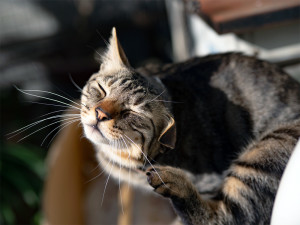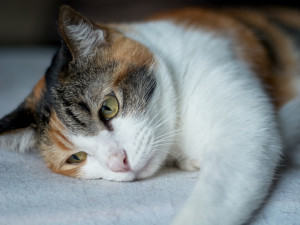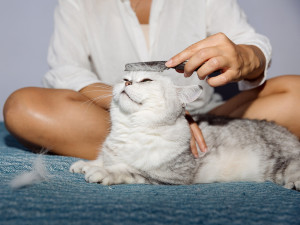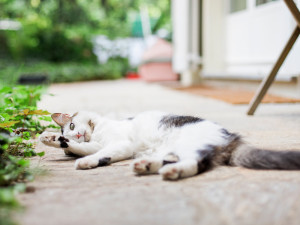Why Does My Cat Have Scabs?
And how to help them heal.

Share Article
In This Article:
Common Causes of Scabs in Cats Specific Cat Scab Locations Cat Scab Treatment Options Home Remedies for Cat Scabs Frequently Asked Questions
Scabs on cats can be caused by a variety of factors, including allergies, skin infections, parasites like fleas or mites, or even stress-induced over-grooming. Identifying the root cause of your cat’s scabs is crucial for providing effective treatment and ensuring their comfort.
Common causes of scabs on cats
Discovering scabs on your cat’s skin during a cuddle session can be upsetting. You expect your cat’s coat to be soft and smooth, but scabs can make it feel rough and gritty. Multiple scabs on a cat’s body often indicate a problem like miliary dermatitis. Feline miliary dermatitis is a term used to refer to the presence of small bumps and scabs that develop on a cat’s skin in response to inflammation. Miliary dermatitis is not a specific disease but rather a description of how various underlying conditions can affect a cat’s skin.
Many cat skin disorders cause scabs; some common conditions include:

Allergies and immune-mediated diseases
Flea allergies: Hypersensitivity to flea saliva is one of the most common causes of intense itching and scabs on cats.
Environmental allergies: Cats may be allergic to pollen, grass, mold or other elements in the environment.
Food allergies: Allergies to certain proteins in food can manifest as skin lesions.
Bug bites: Cats can be hypersensitive to fly and mosquito bites.
Pemphigus foliaceus: This auto-immune disease causes skin lesions in cats including scabs, crusts, and ulcers.
Drug reactions: Adverse drug reactions can cause scabs and other skin lesions in cats.
Infections and infestations
Ringworm: Despite the name, ringworm is actually a fungal infection that causes scabs and fur loss in cats (and is contagious to humans).
Skin infection: Bacterial skin infections can cause redness, scabs, and bumps.
Skin mites: Cats can experience intense itching and develop scabs from skin mite infestations like demodectic mange (Demodex cati), ear mites (Otodectes cynotis), and cheyletiellosis (Cheyletiella blakei).
Lice: Cats can be infested with sucking lice that feed on blood or chewing lice that feed on skin and secretions.
Other causes of cat scabs
Acne: Cats can develop acne when hair follicles get clogged with excess keratin (a skin protein).
Itchy skin: Any condition that causes irritation or inflammation can prompt a cat to excessively lick and groom themselves to the point of self-trauma.
Stress and behavioral issues: Some cats will over-groom as a way to soothe overwhelming stress and anxiety.
Skin cancer: Squamous cell carcinoma is common skin cancer in cats.
Specific cat scab locations
The location of a cat’s scabs can offer clues about the underlying cause. Common areas for scabs on cats include the back, neck, ears, and chin. Not every skin condition follows a specific pattern, so scab location alone isn’t enough to make a diagnosis. However, identifying where on the body the scabs are most prominent may help you and your veterinarian narrow down the cause.
Scabs on a cat’s back
Scabs on a cat’s back can be from a variety of issues, but flea allergy dermatitis is a common cause. Fleas tend to bite along the spine where it’s difficult for cats to groom themselves. A hypersensitivity to flea saliva can leave a trail of scabs along a cat’s back. Scabs on the back can also be a sign of food or environmental allergies.
Scabs on a cat’s neck
Scabs on a cat's neck are often associated with parasites, including fleas, mites, and lice. Food or environmental allergies can trigger itchiness that causes a cat to scratch their neck to the point of trauma and scab formation.
Scabs on a cat’s ears
Irritation from ear mites can trigger constant scratching and inflammation, leading to scab formation. The thin-fur on a cat’s ears makes the area susceptible to fly and mosquito bites. Ears are also a common location for squamous cell carcinoma lesions to develop.
Scabs on a cat’s chin
Black scabs on a cat’s chin is often a sign of feline acne. This occurs when hair follicles get clogged with excess keratin, oil, and debris, causing blackheads to develop. Constant rubbing and scratching causes the area to develop inflammation and scabs.
Cat scab treatment options
Scabby cats often have multiple symptoms like itching, discomfort, fur loss, and scabs. To determine the cause of your cat’s scabs, your vet will get a thorough history and perform a physical exam which will include looking for obvious signs of external parasites. Your vet may start with skin testing to look for the presence of mites, bacteria, or fungus. A diet trial or allergy testing can be performed if food or environmental allergies are suspected. A skin biopsy may also be recommended if there is concern for cancer for deep infection.
The treatment for scabs depends on the cause, but common treatment options include:
Flea control: This includes killing live fleas, treating the environment (including other pets), and using effective flea preventatives.
Medications: Prescription medications may be used to address infections, inflammation, and to reduce the effects of an adverse drug reaction.
Topical treatments: Topical medications are often part of the treatment plan for external parasites and ringworm. Medicated shampoos can help with secondary bacterial or yeast infections.
Dietary changes: Cats with food allergies can benefit from diets that don’t contain proteins that trigger inflammation.
Surgery: In cases of squamous cell carcinoma or other skin cancers, surgical removal may be necessary.
Home remedies for cat scabs
If your cat has scabs, it’s important to consult with your veterinarian before trying home remedies to ensure the treatments are safe and appropriate. You also want to quickly rule out conditions that can be contagious to other people and pets in your home. Once you’ve consulted with your vet about a treatment plan, there are some home remedies that can help keep your cat comfortable.
Grooming
Regular gentle brushing helps to remove dead skin and excess fur, distribute natural oils, and alleviate itchiness. Bathing can remove excess dirt, oil, and dead skin cells. It can also soothe itchy, inflamed skin. Be sure to use medicated shampoos as instructed by your vet.
Keep things clean
Cats with scabs and irritated skin are susceptible to secondary bacterial infections. Clean your cat’s bedding and other areas they like to hang out often. Wash grooming tools and food and water dishes regularly. Dust and vacuum to reduce indoor allergens.
Switch food bowls
Chin acne may be more likely to develop in cats that eat and drink out of plastic bowls. Changing to metal or ceramic bowls may help reduce a cat’s chin acne.
Provide a healthy lifestyle
Being consistent with preventative care can help protect cats from external parasites and underlying conditions that make them more susceptible to skin disease. Keep cats indoors to avoid exposure to biting flies, allergens, and other animals that may transmit disease. Feed a complete and balanced diet and keep your cat’s weight in check so they are able to groom themselves properly.
Don’t pick the scabs
Picking your cat’s scabs can lead to bleeding, infection, delayed healing, and pain. Scabs are part of the healing process, so leave them alone.
FAQs (People also ask):
Why does my cat have bald spots and scabs?
Ringworm, a contagious fungal infection, is a common cause for hair loss and scabs in cats. Cats can also develop hair loss and scabs from allergies, infections, and over grooming.
Why does my indoor cat have scabs?
Even indoor cats can get fleas, mites, and fly bites. Scabs may also be a sign of underlying conditions like allergies, infection, or auto-immune disease. Your vet can help determine the cause of your cat’s scabs and the best treatment.
References

Dr. Alycia Washington, DVM, MS
Alycia Washington is a small-animal emergency veterinarian with over 10 years of experience based in North Carolina. She works as a relief veterinarianopens in new tab and provides services to numerous emergency and specialty hospitals. She also works as a veterinary writer with a focus on educating pet parents.
Related articles
![Woman petting her long haired cat on the sofa.]()
Why Does My Cat Have Dandruff? Common Causes and Treatments
Ever heard of “walking dandruff?” Yep, that’s what we said.
![Gray and white striped cat is scratching his ear]()
What’s Up With My Cat’s Skin?
Everything you need to know about cat allergies, according to three veterinary dermatologists.
Cat Allergies: Do Hypoallergenic Cats Exist?
If the sniffles are getting you down, don’t stress: You have options.
![Man holding his large gray cat.]()
Why Does My Cat Have Bald Spots?
It only makes them cuter, but you may need to address the cause for this condition.
What to Know About Runny Noses in Cats
Nasal discharge doesn’t sound cute, but you need to know what to look out for.
![Cat napping on a yellow couch against a yellow background]()
A Guide to Cat Acne: Find Solutions to Clear Your Cat’s Skin
That's right—your cat can get acne. Here’s how to spot it and treat it.
![A woman brushes a cat's hair.]()
The Best Way to Get Rid of Fleas on Cats, According to a Veterinarian
Fleas sound like villains of a horror movie, and that’s honestly not that far off.
![A white cat in a meadow with flowers and tall grass.]()
4 Best Flea and Tick Preventatives and Treatments to Protect Your Kitty
From collars to topicals to chews, here are the flea and tick preventatives we’re giving our cats this summer.
![a cat licking a hot spot]()
How to Spot, Treat, and Prevent Hot Spots on Your Cat
Hot spots are so not hot—your cat agrees.
![Siberian cat licking her paw outdoors.]()
What to Know About Tapeworms in Cats
The evidence is unmistakably gross when your cat gets an infection. But the (very) good news is that the treatment is pretty effective.












